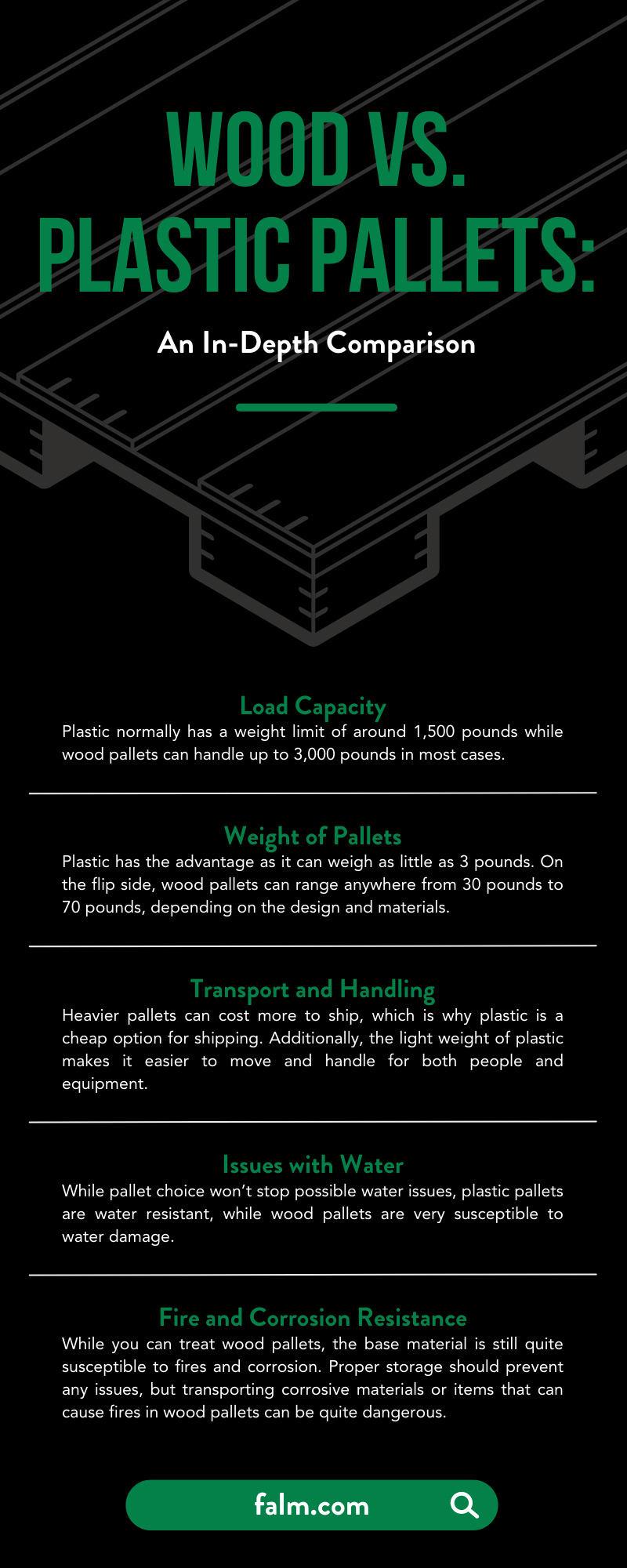- By First Alliance Logistics Management
- August 17, 2023
- Buying Pallets
One of the most important decisions you can make for your business when it comes to storing and shipping products is whether to use plastic or wood pallets. These are the two most common types of pallets out there, but you should likely only choose one. Let’s compare wood versus plastic pallets.
Load Capacity
One of the most important metrics you can use for deciding the best pallets for you is the weight they can carry. While this is an average, most wood pallets can handle more weight than plastic pallets. Plastic normally has a weight limit of around 1,500 pounds while wood pallets can handle up to 3,000 pounds in most cases.
Weight of Pallets
When it comes to the weight of the pallets, plastic has the advantage as it can weigh as little as 3 pounds. On the flip side, wood pallets can range anywhere from 30 pounds to 70 pounds, depending on the design and materials. This weight is for the standard 48″ by 40″ pallet common in most industries.
Transport and Handling
The weight of the pallets is important for many reasons, such as shipping costs and ease of transport. Heavier pallets can cost more to ship, which is why plastic is a cheap option for shipping. Additionally, the light weight of plastic makes it easier to move and handle for both people and equipment.
Issues with Water
Water damage is a huge worry for anyone storing products or using pallets because water can destroy stock and ruin your equipment. While pallet choice won’t stop possible water issues, plastic pallets are water resistant, while wood pallets are very susceptible to water damage. Additionally, wood pallets can grow mold and fungus in humid environments, which you should check in regular inspections.
Fire and Corrosion Resistance
While you can treat wood pallets, the base material is still quite susceptible to fires and corrosion. Proper storage should prevent any issues, but transporting corrosive materials or items that can cause fires in wood pallets can be quite dangerous. That’s why plastic, which is naturally fire- and corrosion-resistant, is very popular in chemical and pharmaceutical industries.
Environmental Impact
Both plastic and wooden pallets are good choices for their environmental impact, as both are easy to recycle and turn into new products or pallets. However, plastic isn’t biodegradable, unlike wooden pallets, which means it can have a larger impact, while wood degrades faster and can be recycled.
Pallet Durability
When comparing wooden pallets to plastic pallets, the issue of durability is a huge spot of contention. In most cases, plastic pallets can handle more of a beating and won’t crack under the weight of their load, lasting hundreds of trips longer than wood pallets. That’s why plastic pallets are great for storage and reuse inside your storage areas—they’ll last a long time in one spot and can make it through so many uses.
General Life Span
The durability of the materials plays a huge part in how long each pallet can last, which is why plastic can last longer than wood. On average, you can expect plastic pallets to last at least 10 years with good care and storage practices. Wooden pallets will break down and start becoming irreparable and potentially dangerous around 8 to 10 years with good maintenance.
Pallet Repairs
Pallet repairs are a major part of owning a pallet, as a broken or damaged pallet is dangerous for employees and your products. A lot of injuries and accidents happen because of bad pallet care. While good care can make your plastic pallets last longer, it’s nearly impossible to repair them. You’ll need to replace broken plastic pallets from a plastic pallet supplier, but you can repair wood pallets.
Purpose of Pallets
When choosing between plastic pallets and wooden pallets, you need to consider their purpose for your company. When it comes to storage, plastic pallets are more durable and have a longer life span. But wooden pallets are generally better if you’re shipping a lot of items and need pallets for shipment.
Pallet Return
A huge part of deciding which pallet is best comes down to where that pallet is going to end up. Plastic pallets are an investment in your business, so you want them to stay in-house for as long as possible. If you expect the pallet to come back to you, then plastic can work. Otherwise, wooden pallets are a better option since they’re less of an investment.
Sanitation Standards
Some industries transport highly sensitive materials and require clean and sanitary pallets to move their products. While some wood pallets can fit these requirements, plastic pallets are easier to clean and sanitize for these standards. That’s why plastic pallets are so useful for the food and medical industries, as they make and ship products for human consumption.
International Pallet Regulations
If you’re looking to ship pallets internationally, you should be careful when purchasing the pallets. Some countries have restrictions on what type of pallets you can ship in. In most cases, if a country has a restriction on pallet materials, it’s wooden pallets. If you’re shipping internationally, you may need to use plastic pallets.
Disposal Methods
When it comes to disposing of pallets, there are many options. Plastic pallets have a few more limitations on them as you can only recycle them, but you can team up with a plastic pallet supplier to send pallets back to them. Wooden pallets can go to recycling centers, or you can donate them to other companies that need scrap wood.
Cost of the Pallets
One of the biggest differences between wooden pallets and plastic pallets that you should consider is the price. When looking at the flat cost of pallets, plastic pallets are far more expensive per unit than their wooden counterparts. However, good care and the longevity of plastic pallets can make them more cost-effective as you save money over the years. Additionally, working with a plastic pallet supplier means you can work with recycling programs to reduce the cost of the pallets.
There is no one correct choice when it comes to pallet materials. It depends heavily on what you need for your business. Both pallets have their uses and can help grow your business if you properly invest in them and maintain them over the years. If you’re looking for pallets for your company, contact us at First Alliance Logistical Management.


